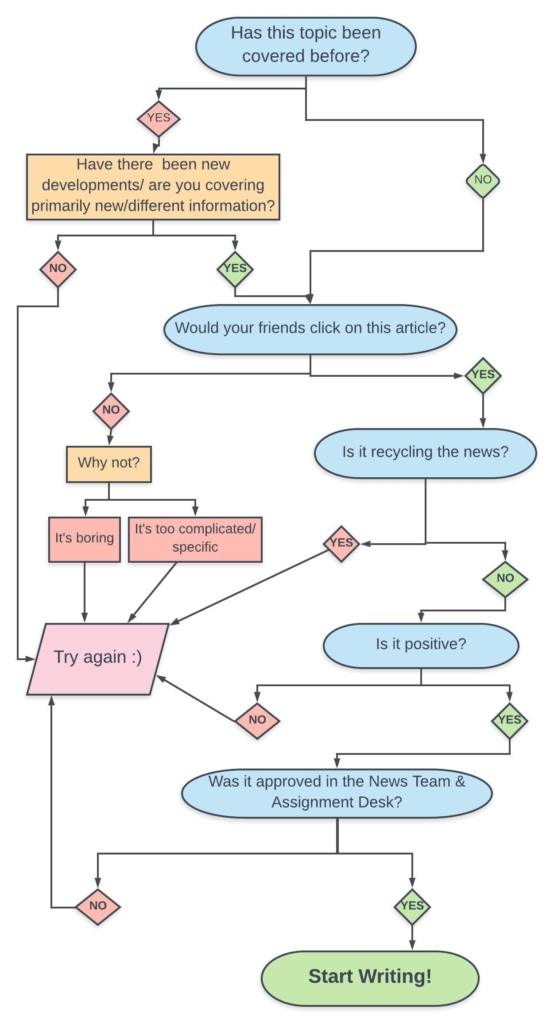WHAT SHOULD YOU COVER?
As a writer, you are a crucial part of the The Borgen Project’s success.
The articles published by The Borgen Project Blog and BORGEN Magazine shape the messaging of the organization, and create a lasting impact on the public’s perception of global poverty.
This page will guide you through selecting article topics that will engage readers and bring attention to global poverty in an innovative way.
Our Messaging:
At The Borgen Project, we focus on highlighting the positive. Your articles are an opportunity to discuss what’s right in the world, rather than simply focusing on what’s wrong.
Many news outlets insist on portraying impoverished nations, communities and people as helpless (think stereotypical images of starving children and women carrying water). But, that’s not what we do. At The Borgen Project, we are devoted to solving global poverty, and we want to communicate to our readers that these problems can be solved.
We know that the best argument for foreign aid is presenting proof of its past successes. Therefore, in addition to presenting an accurate representation of the conditions at hand, our articles must contain solutions that highlight the progress being made.
Who Gives a Damn?
We want everyone to care about global poverty, and achieving this requires covering global poverty in an innovative way. Before writing, ask yourself:
- Would I click on this article?
- Would my parents and friends click on this article?
For example, the average reader will be more inclined to read a story on “5 Ways Hemp Can Fight Poverty and Clean Up the Planet” than one on “Maternal Mortality in Tajikistan.”
What do you/ your friends/ family/ classmates/ coworkers always seem to be talking about? Is it a certain sport, team or athlete? An entertainer? A clothing brand? A company or business?
Connecting global poverty to topics that already have a large following is a great way to bring attention to our cause and reach an audience that we may not normally have access to.
Make the readers come to the story for celebrities/ sports/ etc. and stay for a discussion on global poverty reduction.
Trending topics in action: One our most-viewed articles is an article covering One Direction’s charitable campaign, action/1D.
What Not To Do
If your topic of choice closely resembles the ones below, it is in need of some restructuring. Here are some great examples of what not to do, and why:
- The Effects of Genocide in Rwanda
- Homelessness in Haiti
- Child Refugees in Uganda
- Illiteracy in Hungary
What’s the problem?
- Niche– these topics, while incredibly important, appeal to only a small, specialized section of the general public (most likely readers already familiar with the issue seeking to learn more). Thus, this does not accomplish our goal of engaging the general public in global poverty.
- Negative– some topics make it incredibly difficult to present solutions. For instance, an article on the 10 most recent genocides in the world leaves little room for presenting a positive outlook.
Your Job
You are reporters, and finding interesting topics requires digging for the story: While choosing the topic for your first article was as simple as browsing through the TNC tab, choosing what to cover for the next nine pieces is a whole new ball-game. This is a great time to self-evaluate and leverage your unique resources:
Events: Be on the lookout for what’s happening in your community. Are there any rallies, protests, gatherings, celebrations, etc. that can be tied to global poverty or development? These types of events provide a unique opportunity to conduct primary research and speak to someone who can provide a first-hand account of events or conditions surrounding a particular issue. For instance, at a march in support of refugee rights, you may meet a refugee who is resettled in your community and able to speak with you about conditions in his or her home country.
College Campuses: Seek out a professor who teaches/ has researched international development and speak to him or her about your internship. He or she may have performed primary research, or may be able to connect you with someone in the field- leading to a unique interview.
You can also reach out to the school’s Media Relations or Communications Department and ask for any developing stories you may be able to cover. This will again give you access to a unique source and perspective.
Libraries: Ask a librarian how to research a specific topic you are interested in! Librarians (and college librarians in particular) know of a plethora of sources you may have never heard of; this will help you develop a cohesive argument and present a perspective you may not have been able to find before.
Headlines
Once you’ve come up with your creative topic, it is crucial to introduce it with a headline that will attract the attention deserved.

